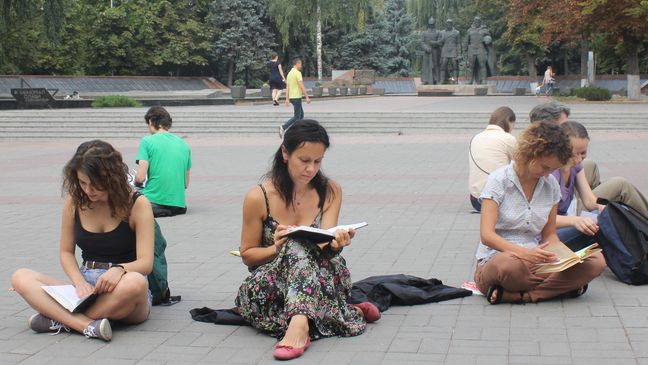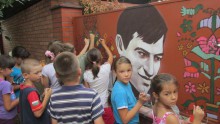Citizens of Vinnytsia dubbed the Palimpsests Stusfest, which swept the city over August 29-30 weekend, “Orpheus’s Return.” Enthusiasts from the Space of Freedom movement, community center Forum, bookstore Ye, Smoloskyp Publishing House, and other organizations and institutions brought a true resurrection of Vasyl Stus’s word and spirit to the city on the Southern Buh River.
I would never blame our city of failing to honor our legendary compatriot Stus. Annual winter Stus Readings have been held for 20 years already, and memorial evenings and requiems occur from time to time at the foot of the poet’s monument. Still, Vinnytsia has never before seen Stus’s poetry celebrated on such a grand scale. He was everywhere: in libraries, bookstores, museums, squares. His poems were transformed into pieces of street art, music, and drama. Thanks to the Palimpsests, Vinnytsia residents were able to communicate with contemporary authors, public figures, and artists from Kyiv, Vinnytsia, and the Donbas. The festival involved also charitable work, for all events served as venues for Ukrainian book collection drives; the organizers promised to donate the books to refugee children from Donetsk and Luhansk regions.
TO READ STUS IN A NEW WAY
The festival was timed to the 30th anniversary of Stus’s death. Why did they choose Vinnytsia as its venue? Well, the poet was born in Vinnytsia region, and Donetsk University, Stus’s alma mater, moved to Vinnytsia due to the ongoing war. However, the festival was relevant not only due to the good round figure of 30. Stus, while originating from Vinnytsia region, was shaped as a person by his early years spent in Stalino (now Donetsk). It was in the Donbas that he first encountered the inhumane Soviet reality and contrasted it to the image of Ukraine which had to be built. Donetsk is currently occupied by the enemy, so making Stus’s legacy relevant is particularly urgent now, say the organizers.
“The festival hosted some interesting discussions about eastern Ukraine,” its co-organizer Dmytro Shtofel told us. “I was particularly surprised to find out that Stus and Rinat Akhmetov grew in the same neighborhood. I should note, however, that the festival is not a requiem event, full of reciting poetic laments and sobbing. Ours is a very positive event, aiming to immortalize the poet for the future generations.”
The main purpose of the festival, at least in the opinion of visitors, was not to commemorate Stus once again, but rather to read him in a novel way: to discern both new and intrinsic meanings of his legacy. The very name Palimpsest, meaning a parchment on which the original text has been effaced to make room for newer, stronger, and more positive writing, probably has to do with this purpose.
THEY IMMORTALIZED THE POET WITH WORD, MUSIC, AND BRUSH
During the festival, its participants immortalized the legendary figure of Stus with word, music, and even brush. The festival started with an artistic provocation of sorts, which took place in the city’s Yevropeiska Square. During the event, authors and activists froze for a moment while reading books of Stus’s poetry. Meanwhile, a frozen portrait of the young poet from Vinnytsia region now graces a library fence in the city’s remote Stare Misto district. There, local artist Oleksandr Nikitiuk, ‘accompanied’ by poets Oleh Kotsarev and Dmytro Shtofel and assisted by young residents of Vinnytsia, created a magnificent art panel.
“I had to re-read the works of our legendary poet,” Nikitiuk admitted. “Strange as it sounds, I discovered a new Stus, one who was cheerful, sanguine, and full of thirst for life. It was the implementation of this interactive project that saw some ideas starting to emerge in my mind. Chief among them was a desire to hold a joint painting event, involving both professional artists and regular citizens of Vinnytsia. We created a contour image, and all participants had a chance to join the effort. All this happened to the sound of Stus’s poems being recited. It was extremely cool! I am grateful to active children of Vinnytsia, residents of Stare Misto, librarians, and the organizers of the festival.”

Photo by Ihor KARLYTSKY
The first day’s evening saw several grand artistic events happening at the festival at once. The regional art museum hosted a recital of Stus’s poems, held to the sound of music composed by Ludwig van Beethoven (the poet’s favorite composer). Tania-Maria Lytvyniuk read the poems, accompanied by conservatory student Pavlo Lysy. Meanwhile, the Kotsiubynsky Museum served as the venue for puppet play Happy Yorick, presented to citizens and guests of Vinnytsia by two actors from the Zhuky theater. “It was the premiere showing. Happy Yorick is based on Stus’s poetry,” chairperson of the Palimpsests festival’s organizing committee Natalia Klymiuk remarked. “Actor pair of Yevhen and Olha Chystokletov lived all their life in Donetsk, but had to move to Lviv due to the recent events. Although they live far from home now, they still see themselves as citizens of Donetsk.”
BRINGING THE PROBLEM OF THE UKRAINIAN DONBAS TO THE FORE
A major idea of the festival was to bring the problem of the Ukrainian Donbas to the fore and discuss the foundations of its Ukrainian identity. To do this, the festival’s organizers planned historical and literary discussions involving Olena Stiazhkina, Dmytro Stus, Liubov Yakymchuk, and Stanislav Fedorchuk as well as meetings with former political prisoner Vasyl Ovsiienko and historian Vakhtang Kipiani. Participants of these events recalled a lot and discussed many issues, ranging from our denationalized fatherland and the Ukrainians’ pre-programmed self-denial to political games and, of course, the figure of Stus.
The real cause of his death, which came in a solitary cell at Kuchino prison camp, still remains a mystery. According to a KGB officer’s version, “his heart failed, as it often happens to people.” According to many dissidents, including Ovsiienko, Stus was murdered. He believes it was not an accident, for the Kremlin benefited from the Ukrainian poet’s death. Shortly before his death, Nobel laureate Heinrich Boll nominated Stus for this most prestigious literary award. It is awarded at the year-end and only to living authors. Had Stus won the prize, it would give impetus for a new wave of the Ukrainian movement, raise the patriotic spirit, and spread the desire for freedom.
Kipiani agrees with this opinion, stating that there were ample reasons for the Ukrainian poet to get the prize, and the Soviets knew it, so they solved this issue quickly and by familiar means. However, the historian objects to statements that the nomination of Stus for the Nobel Prize definitely happened in 1985. He said there was no evidence of the nomination, and therefore this claim could not be seen as a fact.
In turn, young Ukrainian poet and frequent contributor to The Day Liubov Yakymchuk, born in Pervomaisk, Luhansk oblast, presented her collection Apricots of the Donbas. The girl’s poems portray people who see war first-hand as opposed to watching it on TV, those whose lives it entered like a tempest and still makes it impossible to calm down.
On the anniversary of his death, Stus’s painful and truthful words touched hearts of all Ukrainians. He came home – not only to Vinnytsia, but also to Donetsk. He came home to reunite our Ukraine.







